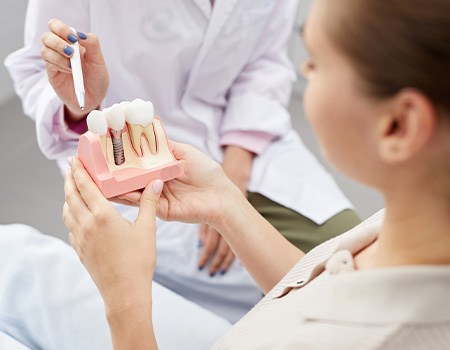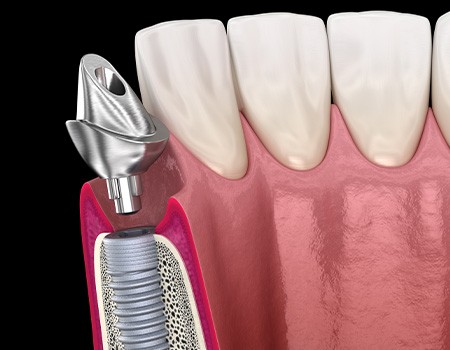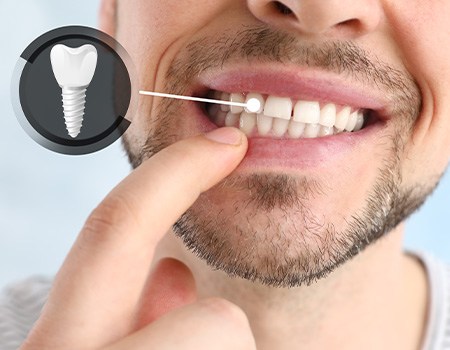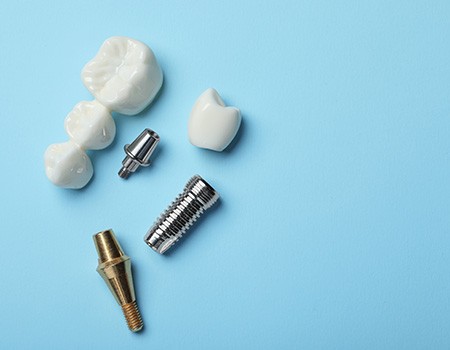
Dental Implants – Spring House, PA
A Permanent Solution for Missing Teeth
Do your missing teeth or unstable denture make your life a little less enjoyable every single day? Do they prevent you from eating whatever you want or smiling without having to think twice? If so, you’re far from alone, and the team at NeoSmile Dental Care is ready to offer you the best solution in all of dentistry: dental implants. Whether you’re missing a single tooth or all of them, we can use this state-of-the-art solution to bring back the strength, health, and confidence of your smile for a lifetime to come.

Why Choose Neosmile Dental Care for Dental Implants?
- Implant placement & restoration performed under one roof
- Treatment plans made using the latest imaging technology
- Friendly team committed to providing fully customized care
The 4-Step Dental Implant Process

Dental implants have a longer treatment process than dentures or dental bridges. That said, please rest easy – their benefits make them worth the time and effort! Our practice places implants in-house, so you’re sure to get the best restoration results possible. Such supervision from our dentists means you’ll enjoy their skills and expertise. In particular, the dental implant process will involve four things: consultation, surgery, osseointegration, and delivery of the final restoration.
Initial Dental Implant Consultation

Before anything else, you’ll visit our office for a consultation. This session lets us confirm your treatment goals, your current oral health, and more. We’ll then review these details to see if dental implants truly suit your smile.
You needn’t worry if we decide you don’t qualify for dental implants. In that case, you can become a candidate later through further dental work – tooth extractions, periodontal therapy, etc. These “extra” services would enable your mouth to support implant posts.
Dental Implant Surgery

Again, our office performs dental implant surgery in-house. Our dentists oversee the placement work alongside the rest of our team. For that reason, you can expect amazing results from your treatment.
To be specific, the dental implant surgery will involve the following:
- Numbing – We’ll numb the treatment site before anything else, ensuring you don’t feel pain during placement. The most you’ll sense is a slight pressure.
- Incision Work – Our team will make an incision in your gums to create space for the dental implant.
- Placement – Once the incision is made, we’ll place the implant before suturing your gums shut.
- Capping – We’ll conclude your surgery by putting a protective cap over your dental implant.
Dental Implant Osseointegration & Abutment

After the initial surgery, your dental implant will slowly fuse with your jaw. This process – called osseointegration – takes 4-6 months to complete. When finished, it’ll ensure your implant post is a secure and permanent part of your mouth.
You’ll attend a follow-up surgery (at our office) shortly after your implant fusion ends. At that time, we’ll place the abutment – a special metal connector – that secures your restoration. A dental lab will craft the latter prosthetic while you heal from this second surgery.
Delivery of Dental Implant Restoration(s)

Our team will deliver your dental implant’s final restoration toward the end of treatment. This device could be a dental crown, dental bridge, or even an implant denture. Ultimately, its nature will depend on how many teeth you’re replacing.
In most cases, we don’t take long to fit the final restoration. Our team only needs to apply some dental cement; that material should hold it in place. After making a few last-minute changes (to ensure good results), we’ll send you off to enjoy your full and restored smile!
Benefits of Dental Implants

Unlike traditional tooth replacements that only bring back the visible part of the tooth (the crown), implants go a step further and restore the underlying root as well. A tiny titanium post is inserted directly into the jawbone to mimic the root structure, and this provides the foundation for a new crown, bridge, or denture. This approach has several advantages compared to traditional treatments:
- Stability: Because implanted teeth are firmly anchored within the jawbone, patients are able to eat whatever they want without worrying about their prosthetics shifting or breaking.
- Aesthetics: Implants are built just like natural teeth and topped with custom-made, all-porcelain restorations, meaning they look just like real teeth as well.
- Long-Term Oral Health : Dental implants also stimulate the jawbone and prevent it from atrophying, which is a prominent risk after tooth loss. This protects not only the remaining teeth but helps a patient maintain a more youthful facial shape as well.
- Lifelong Solution : With just routine oral hygiene and dental checkups, implants can be trusted to last for multiple decades on end.
Indications for Dental Implants

If you’re interested in getting dental implants, the first step is to come see Dr. Krunal Patel for a consultation. At this appointment, they’ll examine your remaining teeth, jaw, and gums to make sure you’re a qualified candidate for the treatment. Typically, patients need relatively good dental health before the procedure can begin. Once a patient is approved, our dentists will help them choose from one of the following restorative options:
Missing One Tooth

Traditional bridges require the teeth surrounding a missing tooth to be filed down in order to hold the prosthetic, meaning healthy dental structure has to be sacrificed. With a dental implant, however, a single root and crown can be placed between two teeth without them being reshaped at all.
Missing Multiple Teeth

In addition to placing multiple crowns throughout the mouth, implants can also provide a base for dental prosthetics. A partial denture can fill gaps throughout the mouth like the piece of a puzzle, while a bridge can replace consecutive missing teeth using just two posts. Compared to traditional bridges and dentures, implanted ones have a much stronger hold.
Missing All Teeth

All it takes is just four to six strategically placed implant roots to restore an entire row of teeth using a custom-made denture. With implant dentures, patients never have to deal with the slippage and instability common with removable dentures, plus they’ll enjoy a much stronger bite as well.
Understanding the Cost of Dental Implants

When it comes to replacing your teeth, you get what you pay for. Dental implants may seem costly; however, they are a long-term investment in your oral and overall health, self-confidence, and quality of life.
Because dental implants are a highly customizable treatment, individual prices will vary depending on your needs.
At NeoSmile Dental Care, we want you to be satisfied with your decision to get dental implants, so we’ll always provide you with a cost estimate before your treatment begins. We pledge to do our best to make your treatment as affordable as possible by maximizing any insurance benefits, accepting dental insurance, providing a money-saving in-house membership plan, accepting financing through CareCredit and Sunbit, and even offering periodic specials such as free dental implant consultations.
While dental implants are more expensive than other methods of restoration, their benefits are well worth the investment, and remember, because your dental implants are designed to last a lifetime, this can make them the most cost-effective treatment over time.
Preliminary Treatments & Dental Implant Surgery

There are several factors that could affect the total cost of your dental implants. Preliminary treatments such as gum disease therapy, tooth extractions, or bone grafting will add to the overall price; however, these treatments are extremely important in ensuring the success of your dental implants. Thankfully, many of them may be at least partially covered by your dental insurance.
Dental implant surgery is a separate cost, and factors in things like where the implants are being placed in the jaw, and what type of sedation or anesthesia you’ll need. Because we conveniently perform your entire dental implant treatment in-house, you won’t need to worry about working with an outside surgeon or practice for the surgery.
The Parts of Your Dental Implant

Other factors that may affect the cost of your dental implant procedure include the details about the restorations themselves. These include:
- Number of dental implants: While one dental implant for one missing tooth will cost less than four to six implants for an implant denture, an implant denture is more cost-effective than replacing multiple an arch of teeth individually.
- Type of restoration: The type of restoration also affects the price. Generally, the smaller the prosthetic, the less expensive. Bridges, dentures, and individual crowns each cost different amounts.
- Size or material: Some implants may need to be longer or shorter, depending on the placement in your jawbone. Some implants may be made of zirconia instead of titanium, which will also affect the price.
- Brand of dental implant: Just like there are different brands of dentures, cars, or cell phones, there are also different brands of dental implants. Certain manufacturers make implants that work better for specific situations. If you have any questions about who makes your implant and/or why your dentist recommends one brand over another for your individual treatment, please don’t hesitate to ask!
How Dental Implants Can Save You Money

It is common for many patients to consider dentures or dental bridges over dental implants because of their lower up-front cost. However, the one-time cost associated with dental implants may be a more cost-effective choice from the start.
Because you won’t need to pay for replacements or adjustments every five to ten years like you do with dentures and bridges, nor will you need to spend money on special pastes, cleaning solutions, or adhesives, dental implants will save you money on monthly costs, too.
Best of all, since your dental implants won’t wear down your teeth or irritate your gums, they’re much easier to keep clean, lowering your risk of oral health problems like gum disease, tooth decay, and even jawbone deterioration, as well as their associated treatment costs.
In fact, studies show that having good oral health will help reduce your risk of many systemic issues and their related treatment costs, too!
Does My Dental Insurance Cover Dental Implants?

While dental insurance doesn’t typically cover the cost of dental implants, there are often exceptions. At NeoSmile Dental Care, our team is happy to review your dental insurance plan and help maximize your benefits.
Typically, a portion of your treatment will be covered, such as a percentage of your final restoration or preliminary treatments. Check your individual plan for details, or feel free to contact our office team for help.
Making Dental Implants Affordable

At NeoSmile Dental Care, we understand the importance of having excellent oral health and a complete smile. Thus, we work hard to ensure that treatments like dental implants are as affordable as possible for our patients. Here are just a few ways we can help:
- Free dental implant consultation
- CareCredit / Sunbit financing accepted
- Affordable In-Office Savings Plan with valuable discounts
- Dental Insurance accepted
Maintaining & Caring for Your Dental Implants

With the proper care and maintenance, studies have shown that dental implants can last for 35 years or longer. At Neosmile Dental Care, our goal is to help you get the most out of your newly restored smile. Implementing good oral hygiene habits at home in addition to being seen by one of our experienced dentists in Ambler every six months can help you do just that. Below, we’ve included some additional tips for caring for your dental implants.
Prioritize Your Oral Hygiene

Be sure to continue your regular dental hygiene routine, even after getting dental implants. Brush your teeth twice a day for two minutes using fluoride toothpaste, and floss at least once a day between your restorations and natural teeth. This is crucial to minimizing plaque and tartar build-up over time. If you don’t do this, gum disease can develop, which could compromise the stability of your new replacement teeth.
Eat a Balanced Diet

Many people aren’t aware that what they eat can also impact their oral health. Processed foods and snacks that are high in sugars and carbohydrates can increase your risk of developing cavities and gum disease because harmful oral bacteria feed off of these molecules. It’s important to maintain a balanced diet by being mindful of excessive carbohydrate consumption. Every now and then, substitute more processed snacks with fresh fruits and vegetables instead!
Break Bad Oral Habits

Do you have a habit of chewing on your ice cubes or biting the end of a pencil or pen when you’re anxious? These habits can contribute to dental implant failure by causing excessive wear-and-tear of your replacement teeth or even causing an implant to become loose. Instead, try to develop healthier habits for your smile to manage your stress, like exercising, squeezing a stress ball, or meditating.
Use a Nightguard

It’s estimated that up to 15% of adults in the United States grind their teeth at night, also called bruxism. This condition can develop as a result of stress, past jaw injuries, or TMJ disorder, and if you have dental implants, it can put their stability at risk. To keep the nightly pressure and force of grinding from causing dental implant failure, we recommend investing in a customized nightguard. By wearing it at night, you’ll not only be able to cushion the tension and force that your jaw joints experience as a result of grinding, but also prevent wear-and-tear of your dental implants.
Schedule Your Routine Checkups & Cleanings

Just like with your natural teeth, coming in for routine checkups and cleanings every six months is important to maintaining healthy dental implants. During these visits, our team at Neosmile Dental Care will thoroughly clean your dental restorations and make sure your dental implants are functioning properly. If we spot any signs of failure, we can address them before the symptoms progress and lead to other issues.
Dental Implant FAQs
Does Getting Dental Implants Hurt?
You can rest assured: Getting dental implants doesn’t hurt. Our dental team works to ensure the placement is smooth and comfortable.
Our main approach will be to numb your mouth before surgery. Given the jawbone has few nerve endings, a local anesthetic will keep you from feeling pain during placement. You’ll likely be sedated, too, lowering your body’s ability to sense discomfort.
Admittedly, your mouth may be sore for a few days post-treatment. This symptom, though, is easily managed with over-the-counter pain relievers. You can also reduce potential swelling with a cold compress. Still, call our office if the ache worsens after two or three days.
Do Dental Implants Decay?
Dental implants never decay; they’re artificial and thus can’t get cavities. However, you’ll need to keep up with your oral hygiene regardless.
You see, the teeth and gums surrounding your implants are still at risk. Without care, your other pearly whites could decay and suffer their own cavities. Similarly, bacteria might infect your gum tissue and cause it to recede or ache. The risk of implant failure will increase if any of these issues occur.
Fortunately, standard oral care is enough to keep these problems at bay. So, then, remember to brush your teeth (implants included) twice daily, floss them once daily, and rinse them with mouthwash as needed.
How Long Does It Take to Recover from Dental Implant Surgery?
Overall, it usually doesn’t take long to recover from implant placement. Your new teeth need a few months to fuse with your jaw, but you can resume normal activities the day after surgery. Just remember to take over-the-counter pain relievers as directed.
That said, you should still be careful in the coming days. You’ll want to avoid strenuous exercise for the first week after placement, as you’d delay healing otherwise. Plus, ensure any bleeding or swelling stops after the first few days. If they don’t, it’d be best for you to return to the dentist’s office.
How Successful Are Dental Implants?
Ultimately, dental implants are highly successful as tooth replacements. When placed by a skilled professional, they have a long-term success rate of over 95%!
Granted, whether your implants succeed will depend on various factors. One is your implants’ location, as some teeth strain more from chewing than others. Others, meanwhile, range from diet and oral hygiene to the frequency of dental checkups.
Raising the odds of your implants’ success is simple enough. By giving them proper oral care and avoiding problem foods (especially crunchy and sticky stuff), they’ll likely work for many years to come. Failure becomes even less likely if you refrain from bad oral habits like smoking and teeth grinding.
I Need a Checkup & Cleaning I Have a Cavity or Broken Tooth I am Missing One or More Teeth I am Interested in Improving My Smile I am Looking for a Dentist for My Child I am in Pain or Had an Accident I am Anxious or Afraid of the Dentist I Want a Straighter Smile I Want to Learn About Sleep Apnea View Our Services


